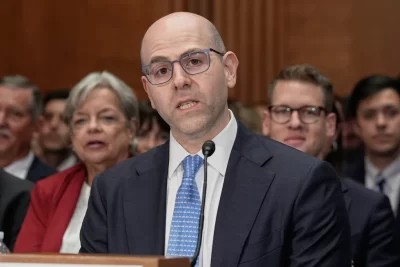
BEIJING — A pile of figure-skating rubble created by Russian misbehavior. A new Chinese champion — from California. An ace American skier who faltered and went home empty-handed. The end of the Olympic line for the world’s most renowned snowboarder. All inside an anti-COVID “closed loop” enforced by China’s authoritarian government.
The terrarium of a Winter Games that has been Beijing 2022 came to its end Sunday, capping an unprecedented Asian Olympic trifecta and sending the planet’s most global sporting event off to the West for the foreseeable future, with no chance of returning to this corner of the world until at least 2030.
It was weird. It was messy and, at the same time, somehow sterile. It was controlled and calibrated in ways only Xi Jinping’s China could pull off. And it was sequestered in a “bubble” that kept participants and the city around them — and, by extension, the sporadically watching world — at arm’s length.
On Sunday night, Xi and International Olympic Committee President Thomas Bach stood together as Beijing handed off to Milan-Cortina, site of the 2026 Winter Games. “Twinkle, Twinkle, Little Star” kicked off a notably Western-flavored show with Chinese characteristics as dancers with tiny, fiery snowflakes glided across the stadium in a ceremony that, like the opening, was headed by Chinese director Zhang Yimou.
Unlike the first pandemic Olympics in Tokyo last summer, which featured all but empty seats at the opening and closing, a modest but energetic crowd populated the seats of Beijing’s “Bird’s Nest” stadium. It felt somewhat incongruous — a show bursting with color and energy and enthusiasm and even joy, the very things that couldn’t assert themselves inside China’s COVID bubble.
“We welcome China as a winter sport country,” Bach said, closing the Games. He called their organization “extraordinary” and credited the Chinese and their organizing committee for serving them up “in such an excellent way and a safe way.”
By many mechanical measures, these Games were a success. They were, in fact, quite safe — albeit in the carefully modulated, dress-up-for-company way that authoritarian governments always do best. The local volunteers, as is usually the case, were delightful, helpful and engaging, and they received high-profile accolades at the closing.
There was snow — most of it fake, some of it real. The venues — many of them, like the Bird’s Nest and the Aquatic Center, harvested from the 2008 edition of the Beijing Olympics — performed to expectations. One new locale, Big Air Shougang, carved from a repurposed steel mill, was an appealingly edgy mashup of winter wonderland and rust-belt industrial landscape.
TV ratings were down, but streaming viewership was up: By Saturday, NBC had streamed 3.5 billion minutes from Beijing, compared to 2.2 billion in South Korea in 2018.
There were no major unexpected logistical problems, only the ones created deliberately to stem the spread of COVID in the country where the coronavirus first emerged more than two years ago.
And stemmed it seemed to be. As of Saturday, the segregated system that effectively turned Beijing into two cities — one sequestered, one proceeding very much as normal — had produced only 463 positive tests among thousands of visitors entering the bubble since Jan. 23. Not surprisingly, the state-controlled media loved this.
“The success in insulating the event from the virus and keeping disruption to sports events to a minimum also reflected the effectiveness and flexibility of China’s overall zero-COVID policies,” the pro-government Global Times newspaper said, citing epidemiologists who say “the COVID-19 prevention experience accumulated from this Olympics can also inspire Chinese cities to adjust their policies.”
Look deeper, though, and a different story emerges about these Games.
Internationally, many critiqued them as the “authoritarian Olympics” and denounced the IOC for holding them in concert with a government accused of gross human rights violations against ethnic Uyghurs and Tibetans in its far west and harsh policies against Hong Kong democracy activists off its southeastern coast. Several Western governments boycotted by not sending any official delegations, though they sent athletes.
For its part, China denied such allegations, as it typically does, and featured a Uyghur as part of its slate of Olympic torch-carriers for the opening ceremony Feb. 4.
And then, of course, there were the Russians. And doping. Again.
The 15-year-old Russian figure skater Kamila Valieva tested positive for using a banned heart medication. The result wasn’t announced by anti-doping officials until after she’d won gold as part of the team competition, even though the sample was taken weeks earlier.
The Court of Arbitration for Sport cleared her to compete in the individual discipline, ruling that as a minor she had protected status. But Valieva, although heavily favored to win, fell several times during her free skate routine, landing her fourth place and prompting a cold reception from her embattled coach, Eteri Tutberidze.






